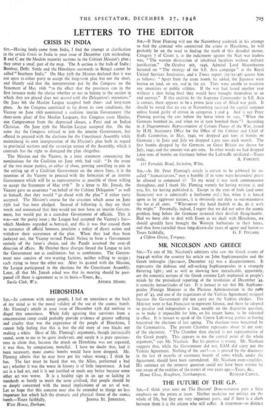Sig,—If Peter Fleming will use the Nuremberg yardstick in his
attempt to find the criminal who committed the crime at Hiroshima, he will probably be on the road to finding the truth of this dreadful matter. Category 7 of Count 3, in the indictment against the Nazi war leaders was, "The wanton destruction of inhabited localities without military justification." On October 9th, 1946, Admiral Lord Mountbatten lectured on " The strategy of the S.E. Asia campaign " at the Royal United Services Institution, and a Times report (10/10/46) quotes him as follows: " Apart from the atom bomb, he added, the Japanese were beaten on land, on sea, and in the air. They were unable to maintain any amenities or public utilities. If the war had lasted another year without a shot being fired they would have brought themselves to an end anyway." If this analysis by the Supreme Commander in S.E. Asia is correct, there appears to be a prima facie case of Allied war guilt. It should be noted that no one at Nuremberg received the capital sentence unless found guilty of crimes in categories 3 and 4. And is not Peter Fleming putting the cart before the horse when he says, " When the Germans bombed us, and when we in turn bombed them "? According to A Diagrammatic Representation of Certain Phases of the War, issued by H.M. Stationery Office for the Office of the Cabinet and Chief of Staffs Committee, in May, 1940, we dropped 40o tons of bombs on Germany ; in June and July we dropped 1,200 tons each month. The first bombs dropped by the Germans on Great Britain are shown for July, 1940, and the amount was 40o tons. In other words we had dropped 1,600 tons of bombs on Germany before the Luftwaffe retaliated.—Yours truly, A. FAWCETT. 117 Ferndale Road, Swindon, Wilts.






























 Previous page
Previous page